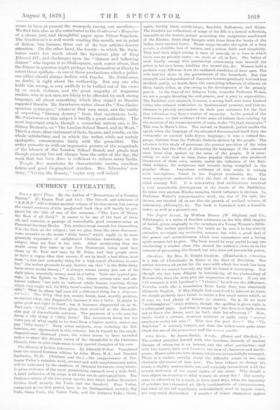CURRENT LITERATURE.
From a Quiet Place. By the Author of "Recreations of a Country Parson." (C. Kogan Paul and Co.)--The friends and admirers of 4‘ A.K.H.B." will welcome another volume of his discourses, but among the varied contents of this goo-sized book they will hardly be pre- pared for the title of one of the sermons,—" The Love of Money the Root of all Good." it seems to be one of the best of them all, and contains a passage of remarkable good common-sense on Parochial Savings-Banks. This readers must consult for themselves, if in the dark on the subject ; but we give, from the same discourse, some remarks on the words "filthy lucre," which ought to ho more generally expressive of enlightened Christian knowledge on the subject than we fear is the case. After mentioning that the Words occur five times in our New Testament, being used four times by St. Paul and once by St. Peter, and that people seem to have a vague idea that money, if not in itself a bad thing, is at learn; "a low and unworthy thing for a high-toned Christian to care for," the writer proceeds to any, farther on, that "in the Bible filthy lucre never moans money ;" it always means money put out of its right place, especially money used as a bribe. Take one typical 'm- ange, in the Epistle to Titus (i., II), where certain vain and dis- honeet talkers "are BEM to 'subvert whole houses, teaching things which they ought not, for filthy lucre's sake,' literally, 'for base gain's attire.' That is, these bad men did a dishonest thing for a disgrace- . ful bribe. The thing they got, money, house, land, worldly position, no matter what, was disgraceful, because it was a bribe. It might be quite good and right in itself ; but it becomes disgraceful or, as St. Paul says, ' filthy,' when thus given, thus received as the discredit. able pay of discreditable services. The payment of a vile man for doing a vile thing is 'filthy lucre.' The mercenary doing for the mere pay of what ought to be done from a higher motive, makes the pay filthy lucre.'" Many other subjects, even including the Mil- lennium, are approached in this volume; but in regard to the much- disputed.over thousand years, the writer seems to have intended rather to state the diverse views of the thoughtful in the Christian Church, than to give expression to any special thoughts of his own.


































 Previous page
Previous page